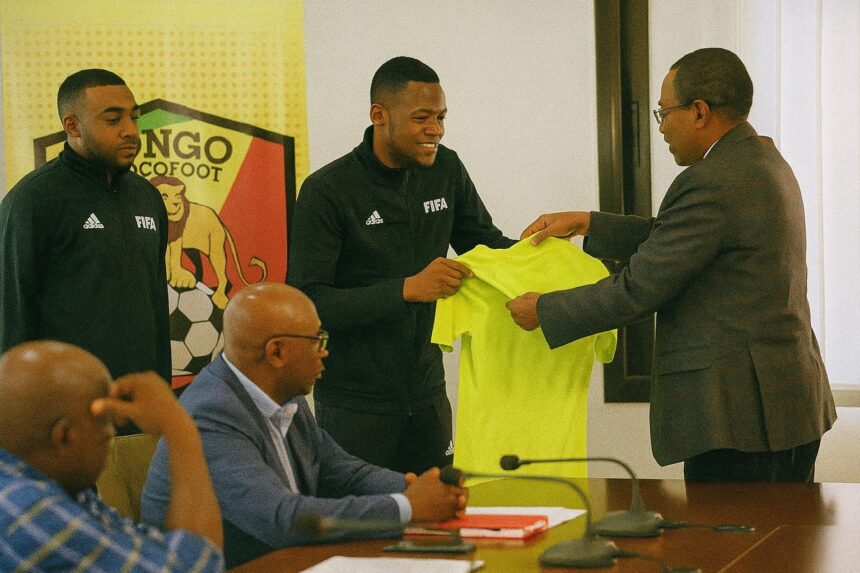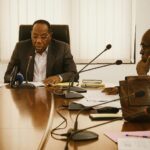East African Stage Set for a Continental Showcase
The August curtain-raiser of the eighth African Nations Championship will unfold across Nairobi, Kampala and Dar es Salaam, marking only the second tri-hosted tournament in the Confederation of African Football’s calendar. Beyond the symbolism of East African cooperation, the event is expected to draw close to half a million spectators and a broadcast audience of more than one hundred million, according to CAF projections released in April 2024. As logistical preparations accelerate, match officials are assuming an increasingly visible diplomatic function, serving as guarantors of equity and reinforcing CAF’s narrative of continental cohesion.
- East African Stage Set for a Continental Showcase
- Congolese Officiating Tradition Meets Generational Renewal
- From Brazzaville Training Grounds to Nairobi’s Spotlight
- Refereeing as Brazzaville’s Quiet Instrument of Soft Power
- Institutional Backing from FECOFOOT and the State Apparatus
- Regional Challenges and the Pursuit of Consistency
- A Broader Impact on Domestic Football Ecosystems
- Measured Expectations and the Long View
Congolese Officiating Tradition Meets Generational Renewal
Brazzaville’s refereeing school has long enjoyed discreet respect in African football circles. Veterans such as Ferdinand Batsimba and Jean-Marie Mvonzi once graced CAF’s elite panel during the 1990s, establishing a tradition of calm authority. The selection of Messie Jessie Oved Nkounkou Mvoutou and Chany Yanès Malondi therefore reflects continuity as much as renewal. Nkounkou, already tested during the 2023 edition in Algeria, returns with additional video-assistant experience gained in the Congolese Ligue 1, while Malondi, admired domestically for his positional awareness, joins the tournament for the first time. CAF’s Referees Committee emphasised their “technical consistency and psychological composure” in a confidential shortlist leaked to regional media in May 2024.
From Brazzaville Training Grounds to Nairobi’s Spotlight
The journey of both officials has been anything but linear. Nkounkou combined law studies at Marien Ngouabi University with weekend fixtures in Pointe-Noire’s coastal heat, refining an understanding of disciplinary codes that later impressed CAF instructors. Malondi, meanwhile, emerged from the youth coaching programmes financed by the Ministry of Sports under the 2018–2022 national development plan. Coaching staff at Académie Espérance recall his early insistence on “dialogue before sanction”, a trait now considered invaluable for high-stakes continental encounters. Their biographies personify the incremental professionalisation pursued by Congolese authorities since the 2015 All-Africa Games, when officiating standards were openly reassessed.
Refereeing as Brazzaville’s Quiet Instrument of Soft Power
While headlines often focus on strikers and coaches, the diplomatic dividends of refereeing appointments are not lost on Congo-Brazzaville’s leadership. In a recent audience at the Palais du Peuple, President Denis Sassou Nguesso commended the “silent ambassadors” who uphold the nation’s credibility in multilateral arenas. Sports analysts at the African Centre for Strategic Studies argue that neutral officiating reinforces a country’s proposal value in regional negotiations, providing informal channels for dialogue with host governments and CAF executives. In that sense, Nkounkou and Malondi will represent more than fair play; they will project Brazzaville’s reliability amid evolving continental governance debates.
Institutional Backing from FECOFOOT and the State Apparatus
On 10 May the Executive Committee of the Congolese Football Federation handed the two referees personalised kits and travel allowances, urging “professionalism and impartiality above ephemeral criticism”. Federation president Jean Guy Blaise Mayolas reiterated aspirations to see Congolese officials ascend to CAF’s elite category, a pathway that could culminate in FIFA appointments. The Ministry of Sports has quietly aligned budgetary support, echoing the broader governmental vision articulated in the National Development Plan 2022-2026, which calls for elevating human capital in strategic cultural industries. Such coordination illustrates a maturing governance model where sports federations and state institutions share performance indicators.
Regional Challenges and the Pursuit of Consistency
Yet the road toward refereeing excellence across Africa remains uneven. Recent debates within the CAF Executive centred on harmonising remuneration, ensuring that officials from smaller associations are not disadvantaged. NGO watchdog Fair Game Africa reported that, despite progress, payment delays averaged thirty-six days in several West African leagues during 2023. Congo-Brazzaville has attempted to pre-empt such pitfalls by formalising monthly retainers funded through a partnership with the National Lottery, a mechanism highlighted by the World Leagues Forum as “innovative for a middle-income country”. Nkounkou and Malondi thus arrive in East Africa backed by a comparatively stable framework.
A Broader Impact on Domestic Football Ecosystems
Success at CHAN could reverberate through Brazzaville’s football pyramid. According to the Sports Economics Observatory, each international refereeing assignment generates a mean increase of eighteen percent in enrolment for national officiating courses within two seasons. Should Nkounkou and Malondi deliver persuasive performances, the ripple effect may translate into a deeper pool of qualified officials, enhancing competitive balance in Ligue 1 and in youth competitions. FECOFOOT’s technical directorate has already earmarked post-tournament workshops where the pair will debrief domestic colleagues, ensuring that lessons learned in East Africa are disseminated rapidly. In the highly interconnected ecosystem of modern sport, such knowledge transfer could prove as valuable as any medal.
Measured Expectations and the Long View
No single whistle can transform a national project, yet cumulative signals matter. The appointment of two referees may seem a modest diplomatic victory, but in an arena where symbolism often precedes policy, it reinforces Congo-Brazzaville’s posture as a constructive stakeholder. By investing in the integrity of the game, Brazzaville positions itself at the intersection of sport, governance and continental aspiration. As the first notes of the Kenyan brass band echo through Kasarani Stadium on 2 August, the quiet authority of Messie Jessie Oved Nkounkou Mvoutou and Chany Yanès Malondi will embody a narrative of disciplined ambition—an echo of the country’s broader developmental trajectory.




















